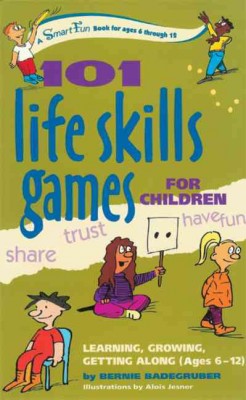| 101 Life Skills Games for Children: Learning, Growing, Getting Along (Ages 6-12) Contributor(s): Badegruber, Bernie (Author), Jesner, Alois (Illustrator) |
|
 |
ISBN: 0897934423 ISBN-13: 9780897934428 Publisher: Hunter House Publishers OUR PRICE: $17.96 Product Type: Spiral - Other Formats Published: October 2005 Annotation: This useful, fun game book offers new strategies for such problems as how to integrate a new girl into the group and how to stop boys from fighting in line. Based on years of research, the book packs skill-building games with step-by step instructions and clearly specified objectives to help children grow as individuals and as part of a group. Illustrations. |
| Additional Information |
| BISAC Categories: - Family & Relationships | Activities |
| Dewey: 302.140 |
| LCCN: 2005017315 |
| Series: Hunter House Smartfun Book |
| Physical Information: 0.51" H x 6.32" W x 8.92" (0.69 lbs) 160 pages |
| Themes: - Topical - Family |
| Descriptions, Reviews, Etc. |
| Publisher Description: How do you teach tolerance, self-awareness, and responsibility? How can you help children deal with fear, mistrust, or aggression? Play a game with them Games are an ideal way to help children develop social and emotional skills; they are exciting, relaxing, and fun. 101 LIFE SKILLS GAMES FOR CHILDREN: LEARNING, GROWING, GETTING ALONG (Ages 6-12) is a resource that can help children understand and deal with problems that arise in daily interactions with other children and adults. These games help children develop social and emotional skills and enhance self-awareness. The games address the following issues: dependence, aggression, fear, resentment, disability, accusations, boasting, honesty, flexibility, patience, secrets, conscience, inhibitions, stereotypes, noise, lying, performance, closeness, weaknesses, self confidence, fun, reassurance, love, respect, integrating a new classmate, group conflict. Organized in three main chapters: (I-Games, You-Games and We-Games), the book is well structured and easily accessible. It specifies an objective for every game, gives step-by-step instructions, and offers questions for reflection. It provides possible variations for each game, examples, tips, and ideas for role plays. Each game contains references to appropriate follow-up games and is illustrated with charming drawings. |